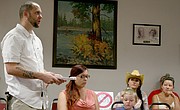Public weighs in on Libby dog ordinances at Aug. 31 meeting
Libby City Council’s Ordinance Committee has proposed abolishing the city’s breed specific ordinance and refining the vicious dog ordinance in its place, a move some opponents say does not adequately address a bigger issue — the rights of the animal.
At an Aug. 31 meeting, Committee Chair Kristen Smith opened by thanking Corey Cromer and Wendy Anderson of animal control for their presence and for advising the committee, along with Libby Police Chief Scott Kessel, who was not present.
A small crowd comprised mostly of opponents to the existing ordinance were present, equipped with protest signs and cameras. One of them, Christopher Johnson, addressed the committee, saying he was happy to hear that the breed specific language would be abolished, but asked: “What about a dog that is defending its home, doing its job? I think a dog that is chasing someone away from it’s home does not deserve to be ‘destroyed’ as the ordinance terms killing dogs.”
Johnson was referring to the proposed dangerous/vicious dog ordinance definition of a dangerous dog, which states that a dangerous dog is one that has, in the opinion of an animal control officer, “without provocation chased, confronted or approached a person in a menacing fashion, so as an average person would fear an attack.”
Smith said that taking the breed specific aspect out of Libby’s dog-related ordinances will not change how animal control handles dogs that are dangerous or vicious.
“We always handle each animal on a case-by-case basis,” Anderson said.
“Our aim is never to euthanize an animal,” Cromer added. “But as a last resort that is sometimes the best thing for the animal. There are mental illnesses and physical deformities (for) which we have treatment for humans that we just can’t treat in dogs.”
Johnson suggested rehabilitation and “a second chance” for dogs termed vicious or dangerous.
“I’m not sure the city would be comfortable with that,” Cromer replied. “It’s potentially a liability.”
Smith said to Johnson that further definitions and examples could be added to the section addressing repercussions, which states that failure to control a vicious or dangerous dog may result in animal control having reason to “regulate, restrain, control, kill or quarantine any such dog.”
“We could define it further, for example, saying that ‘regulate’ may mean ‘get out of city limits’,” Smith said, adding “this may be what Mr. Johnson is getting at — what recourse is there for the owner?”
Libby resident Bill Cunnane said he thought the changes suggested were “reactive, not proactive.” Citing two incidents in the last month in Libby where he witnessed a pit-type dog being aggressive, once to a police officer and once to another dog at the “Ignite The Nites” car show, Cunnane said that some dogs are by nature more aggressive.
The committee will meet again next month to make any adjustments to the ordinance. Smith said that the formal codification process will likely take two to three months.



